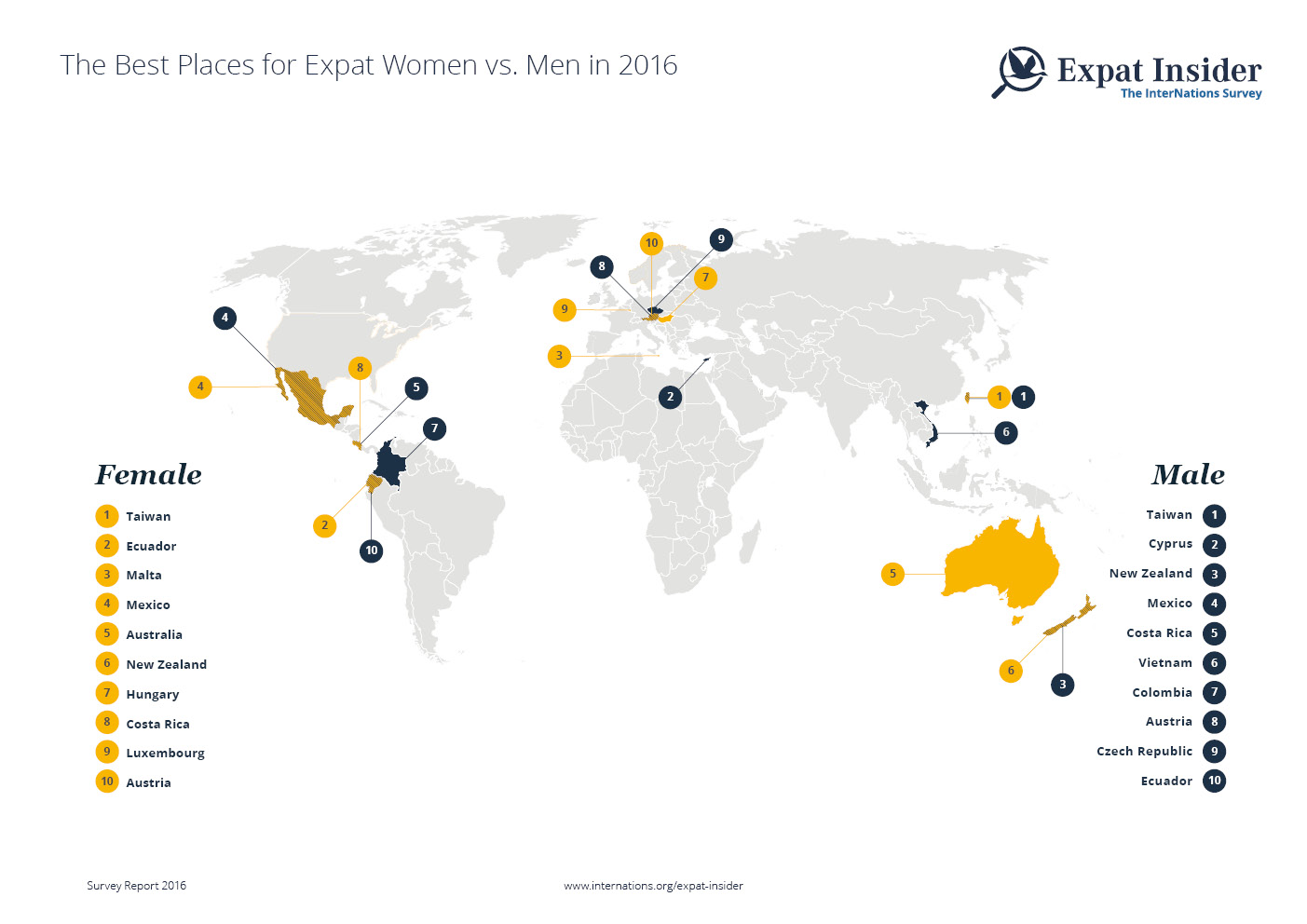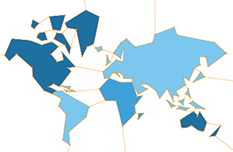Expat Women vs. Men: Divided Opinions
- Men more than twice as likely as women to feel completely at home in Taiwan
- Women find it easier to get used to the local culture in Hungary
- Ecuador ranks 7th for women but 26th for men in Quality of Life Index
- Ranking 2nd for men, Cyprus comes in 49th for women
In order to be counted in this ranking, a nation needed at least 31 male or female respondents. As a result, a total of 57 countries rank for women and 62 countries for men. When the survey results of women and men are looked at separately, a considerable difference of opinion emerges in several countries.
Men and women are in agreement that Taiwan is 2016’s survey winner, as this Asian country also comes in first place for each gender individually. There are still some differences, however. For example, men are more than twice as likely as women to feel completely at home in the local culture (33% vs. 15% for women).
Ecuador snags second place for women, but only comes in tenth for men. There’s a big difference in the Quality of Life Index, where it ranks 7th for women but 26th for men. Opinions especially vary when it comes to socializing and leisure activities. Over nine in ten women (91%) are overall satisfied with their social life, whereas only 72% of men say the same. Men in Ecuador are more likely to think it is difficult to get by without speaking the local language: 22% of men completely agree vs. only 3% of women. Ecuador comes in first for women in the Cost of Living Index, with 90% generally agreeing that this is good. Only two-thirds of men (66%) feel the same.
Malta rounds out the top three countries for women in this year’s survey.
After Taiwan, Cyprus ranks second for men in the 2016 survey. New Zealand comes in third for men and a slightly lower sixth for women. Men there are on the whole more satisfied with their jobs than their female counterparts, with 23% giving this the best possible rating, compared to only 14% of women. Four in five men generally find it easy to make friends in New Zealand. This percentage is only 64% for women. The friendliness of Kiwis towards foreign residents is something women are also less impressed by, with 78% in general agreement vs. 93% of men.
Women in Hungary Find It Easy to Adapt
Hungary ranks 7th out of 57 countries for women but only 36th out of 62 countries for men in the 2016 survey. It seems that career prospects are better for women, with 77% voicing general satisfaction. Less than half of men (48%) are similarly content. Interestingly, however, more men say their disposable household income is sufficient for daily life than women. Four out of ten men say they have a lot more than enough, next to only one in ten women.
Female survey respondents are more pleased with their socializing and leisure activities, though, with 35% who couldn’t be happier with them. Only about one in five men (19%) feels the same. Women find it easier to get used to the local culture in Hungary. Almost one-quarter of women (23%) say this is a piece of cake, compared to 9% of men.
Work-Life Balance for Women in India
Women in the 2016 survey rank India 26th out of 57 countries, whereas men are much less impressed, leading to a ranking of 52 out of 62 countries. The biggest difference is in the Working Abroad Index, where India holds 17th place for women but only 36th for men. Men are considerably less happy with their work-life balance than women (46% vs. 76% generally satisfied). This is possibly linked to the fact that of those women with a job, 37% work part time, opposed to only 5% of working men.
Women are much more enthusiastic than men about the friendliness of Indians towards foreign residents: 36% of women vs. 20% of men are completely satisfied with this aspect of life abroad. Women are also happier with their financial situation: almost three-quarters (74%) are happy on the whole in this regard, compared to 63% of men.
Cyprus: Much More Popular among Men
Cyprus ranks much better for men than women. As mentioned above, the country even holds the second spot for men. Among women, however, it is way down in the bottom 10 at 49th out of 57 countries. This is the biggest difference between men and women in this year’s country ranking!
These varying opinions can possibly be explained by the quite dissimilar demographics of the different genders in Cyprus. Men are 52.2 years old on average, whereas the average woman is only 44.2 years old. Similarly, male expats are three times more likely to be retired (39% vs. 13%).
Women are significantly less happy with their personal finances compared to men. Whereas over seven in ten men (71%) say that their disposable household income is generally enough for their daily lives, only 37% of women are of the same opinion. Similarly, just over one-third of men (34%) are completely satisfied with their financial situation. Among women, this is only 10%. The fact that 15% of women, compared to only 7% of men, are looking for work may partly account for these results.
It seems men are also happier with their social lives, with 35% completely content with their socializing and leisure activities. Only 14% of women are similarly enthusiastic in this regard. Men and women in Cyprus also don’t agree at all about the friendliness of the local residents towards foreigners. Whereas 58% of male expats are completely happy with this aspect, only 27% of women are of the same opinion. Men even find it easier to make new friends, with 39% completely satisfied in this regard compared to only 20% of women.
Affordable Healthcare for Men in Finland
Finland also shows stark differences between men and women, garnering 11th place for men and only 41st place for women. Almost four in five men (79%) are overall satisfied with the available leisure activities. Just over half of women (51%) agree. Interestingly, opinions also diverge about the political stability in Finland, with over double the percentage of men rating it as excellent (54% vs. 25%). Men are also much more enthusiastic about the affordability of healthcare, with 81% giving it a positive rating. Only 63% of women agree.
In the Working Abroad Index, a measly 5% of women are completely satisfied with their jobs, compared to almost one-quarter of men (24%). And only half of women have a favorable opinion of their work-life balance, whereas about three-quarters of men (76%) are generally happy in this regard.
Expat Men: Feeling at Home in Colombia
Whereas Colombia ranks in the top ten for men (7th out of 62 countries), it is firmly in the bottom half among women (35th out of 57 countries). Women are generally less satisfied with their financial situation, with 62% voicing overall contentment with this aspect of life abroad, up against 82% of men. Female expats are also less pleased with their career prospects. While three out of ten men couldn’t be happier with their opportunities for advancement, only 8% of women feel the same.
Different opinions emerge about the opportunity to travel as well: 85% of men are generally content with this facet of life in Colombia, but only 68% of women express similar views. Men also find it easier to feel at home in this South American country. Nearly four in five men (78%) give this factor a positive rating, compared to only two-thirds of women (66%).
Sweden: Better Job Satisfaction for Men
Sweden is another Nordic country that fares much better among men (19th place) than women (46th place). On the whole, men are much happier with their jobs in Sweden than women are. For example, only 40% of women are satisfied in general with their career prospects, compared to 66% of men.
Men are also much more likely to be content with their financial situation. Nearly three-quarters of men (74%) give this aspect a positive rating, next to only 47% of women. Female expats voice more discontent about the high cost of living in Sweden than men. Among women, only 23% are generally satisfied with this aspect, whereas 34% of men give this a favorable rating. Feeling at home in Sweden is another area where male opinions surpass those of their female counterparts. While only a mere 5% of women feel completely at home there, 16% of men do.




